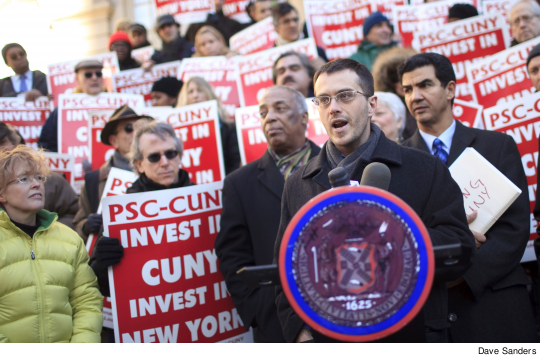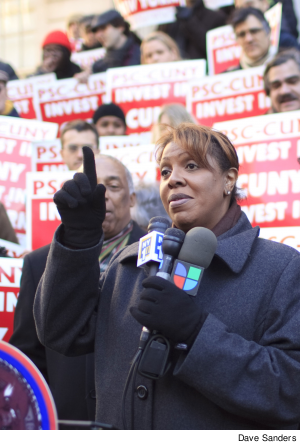 |
“There really is something wrong with the huge inequality that exists in our society,” said Steve London. “With such huge wealth in our city, to talk about austerity just does not make sense.” That’s what London, the PSC’s first vice president, told a City Council hearing on Mayor Bloomberg’s midyear budget cuts.
Citywide and on CUNY campuses, the PSC has a consistent message: there is an alternative, and we need the political courage to pursue it.
“CUNY students are being punished for a budget shortfall they did nothing to create,” PSC President Barbara Bowen said at a December 8 press conference at City Hall. “It isn’t smart and it isn’t fair to endanger New York’s economic future” by cutting higher education, Bowen said.
About 80 people turned out on short notice to fill the steps of City Hall, with signs that urged, “Invest in CUNY, Invest in New York.” The event was organized jointly with City Council Higher Education Committee Chair Ydanis Rodríguez.
Councilmember Jumaane Williams, a graduate of Brooklyn College, agreed that budget alternatives were both necessary and possible. “The biggest expansion of CUNY happened during the Great Depression,” Williams said. “If they had the money then, we definitely have the money now.”
When the mayor was seeking re-election, he sang a different tune, Rodríguez recalled. At the start of this year, well into the current economic crisis, Bloomberg pledged to make CUNY community colleges “one of my biggest priorities” and talked about budget increases, not cuts. “What happened to the $50 million you promised, Mayor Bloomberg?” Rodríguez asked.
The strong turnout at the press conference helped convince Council leaders to hold a joint hearing of the Finance and Higher Education Committees on December 13, to assess the effects of midyear reductions Bloomberg has imposed on CUNY and other vital services.
 |
DEVASTATING CUTS
Bloomberg’s $11.8 million midyear reduction this year will grow to a $16.3 million cut in fiscal 2012. That means a 5.4% cut in City funding for CUNY this fiscal year, and an 8% drop in the year to come. Before these latest cuts, CUNY community colleges had already lost $29 million in State aid over the last two years.
CUNY Vice Chancellor for Budget and Finance Marc Shaw was unusually blunt about the educational impact. The reductions “affect all academic and support operations at the campuses, and will be felt by students at every level,” Shaw said, and he outlined likely consequences at each affected campus. His candor reflected the intense budget discussions going on at CUNY campuses, in which union chapters are playing an increasingly assertive role (see sidebar).
Shaw said that at Hostos, for example, “approximately 70 class sections per semester would be lost. Library hours in the evening and the weekend would be eliminated. The Hostos Academic Learning Center would be severely impacted, minimally resulting in the loss of almost four full weeks of tutoring, [as well as] weekend tutoring services.”
Rank-and-file PSC members told the hearing what it looks like when you meet those cuts in person. “As an example as to what this budget cut can do, a young father who works full time as a security guard came in to me distraught, tears in his eyes,” said Linda Alexander Wallace, director of counseling at Hostos, “because some courses he needs to meet his graduation requirement may not be available to him in the Spring, because we can’t provide the faculty to teach them.” Wallace said she fears that cuts will leave her college “unable to meet the demand for courses that our students need in order to fulfill their dreams.”
TUITION PROTEST
Last month’s decision by CUNY Trustees to seek a tuition increase was the target of a student protest on December 14 outside the Manhattan office of Governor-elect Andrew Cuomo. A lawsuit against the proposed hike was filed three days later. “This is an outright assault on our communities, on getting access to public education,” Lehman College Christian Peruyero told NY1 News when the suit was filed.
As the cuts take hold, colleges are deciding how to cope. Too often, PSC chapters say, the choices they make are the wrong ones.
The cuts now being implemented are serious and they will hurt students’ prospects, union leaders say. But this level of reductions should not require cuts in instruction. Colleges need an open public discussion about budget alternatives, PSC activists contend, to ensure that cuts do the least harm to students, faculty and staff.
That requires transparency, and full disclosure of information by college administrations. As union chapters press for answers to budget questions, they are all raising the same demand: open the books!
To have a truly open discussion of campus finances, a college administration needs to provide an “all-funds” budget. “An ‘all-funds’ budget means that it isn’t limited to tax-levy funds,” Bowen told union delegates in December. “Colleges also get money from overhead on grants, money from the Research Foundation, money from a college’s own foundation, money from the different auxiliary services like food services or the campus bookstore.”
ACCESS TO INFORMATION
The point, she said, is that there are several streams of revenue that a college can draw on. Without full disclosure, some of those streams may be protected. “Maybe a fund that pays for the president to organize special meetings is not being tapped, and maybe that money could pay for an additional HEO-line hire to prevent further escalation in workload,” Bowen said.
Knowledge is power – and power is something that administrators often don’t like to share. Because management is often reluctant to provide an all-funds budget, the PSC has filed a Freedom Of Information Law (FOIL) request, seeking the total budget picture for every college. Individual union chapters are also pressing the issue in labor/management meetings, some with more success than others (see sidebar).
“Faculty and staff have a right to know where their money is,” Bowen said. “Transparency won’t make the cuts disappear. But we want to make sure that before a college decides to rely on super-jumbo classes and cutbacks in adjunct jobs, that alternatives are considered.”

